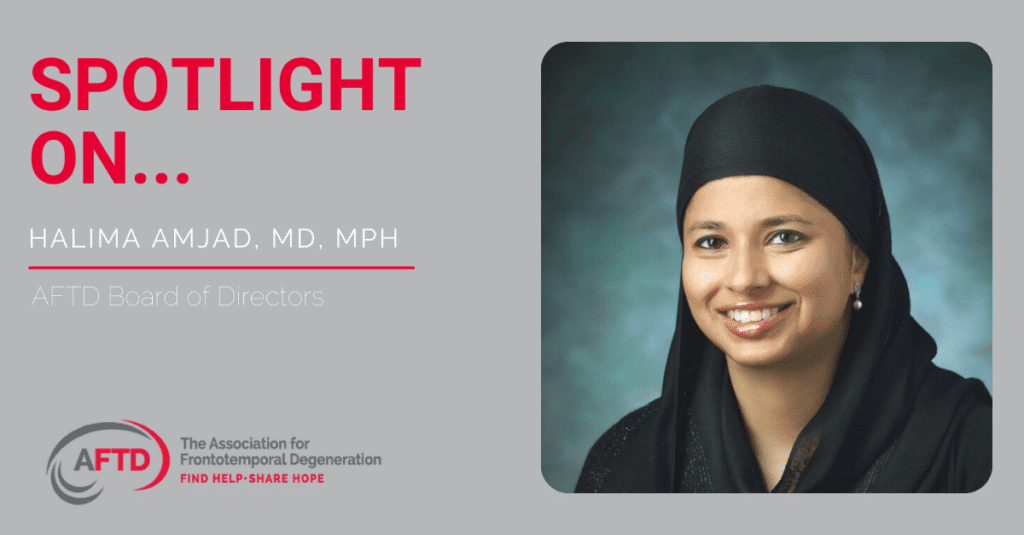Spotlight on…Dr. Halima Amjad, AFTD Board of Directors

Halima Amjad, MD, MPH, knew she wanted to be a doctor since she was a child, but her career trajectory wouldn’t be determined until her late father was diagnosed with FTD, in 2008.
Dr. Amjad, a geriatrician and assistant professor of medicine at the Johns Hopkins University School of Medicine, has dedicated much of her medical career to dementia research and assisting other families impacted by dementia, including FTD. “I feel an obligation and duty to provide what service and support I can,” she said.
“It’s entirely my dad’s illness and journey that brought me to doing the work in my career,” she added.
In his late 50s, her father, who immigrated from Pakistan to the U.S. in the 1970s, began having trouble with his language and finding words. The once easygoing, humorous, and laid-back dentist that Dr. Amjad and her family once knew became gruff, indifferent, and easily frustrated. A diagnosis of primary progressive aphasia (PPA) followed.
Despite her medical background, Dr. Amjad said that she didn’t know much about FTD at the time. She turned to online resources and attended support groups and conferences to learn more. An AFTD event she and her mother attended provided her first opportunity to connect with others who truly understood the FTD experience.
“We’ve always appreciated the opportunity to see and connect with other families,” Dr. Amjad said. “We have used tips that other caregivers have shared for dealing with issues like incontinence and wandering.”
Dr. Amjad, who delivered the keynote address at AFTD’s 2017 Education Conference, joined AFTD’s Board in April. Along with her personal FTD experiences, Dr. Amjad said she intends to add to the Board the “view of a clinician and a geriatrician that straddles primary care as well as specialty dementia care.”
Dr Amjad continued: “I [intend] to leverage those experiences – my knowledge of the healthcare system and challenges families living with dementia are facing – while also thinking of how AFTD can advance education and awareness about FTD.”
Dr. Amjad’s father died in March at age 72, after spending two years on hospice. She told AFTD that
her family valued the time they got to share with her “soft-hearted, generous” father during those last few years.
“We cherish all of the time that we’ve had with him, even if he couldn’t speak or we couldn’t do everything,” she said. “The moments we could still sit with him, laugh with him, smile with him, watch our videos, look at our pictures — it’s something we all hold dear.”
By Category
Our Newsletters
Stay Informed
Sign up now and stay on top of the latest with our newsletter, event alerts, and more…
